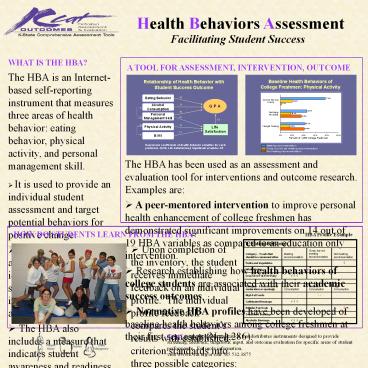Health Behaviors Assessment - PowerPoint PPT Presentation
1 / 1
Title:
Health Behaviors Assessment
Description:
Health Behaviors Assessment Facilitating Student Success WHAT IS THE HBA? The HBA is an Internet-based self-reporting instrument that measures three areas of health ... – PowerPoint PPT presentation
Number of Views:58
Avg rating:3.0/5.0
Title: Health Behaviors Assessment
1
Health Behaviors Assessment
Facilitating Student Success
- WHAT IS THE HBA?
- The HBA is an Internet-based self-reporting
instrument that measures three areas of health
behavior eating behavior, physical activity, and
personal management skill. - It is used to provide an individual student
assessment and target potential behaviors for
positive change. - The HBA is useful as a screening device to
identify the needs of student cohorts and assist
institutional planning activities. - The HBA also includes a measure that indicates
student awareness and readiness to make personal
improvements. - Since the HBA measures specific behaviors,
anchored by a time dimension, it can evaluate
individual and group changes. - The HBA has been developed by sampling over
2,200 students. An additional 260 students have
received pre-test and post-test evaluations to
measure their progress after interventions.
A TOOL FOR ASSESSMENT, INTERVENTION, OUTCOME
- The HBA has been used as an assessment and
evaluation tool for interventions and outcome
research. Examples are - A peer-mentored intervention to improve personal
health enhancement of college freshmen has
demonstrated significant improvements on 14 out
of 19 HBA variables as compared to an education
only intervention. - Research establishing how health behaviors of
college students are associated with their
academic success outcomes. - Normative HBA profiles have been developed of
baseline health behaviors among college freshmen
at their first semester (N1,286).
HOW DO STUDENTS LEARN FROM THE HBA?
HBA Profile Example
II. Eating Behavior II. Eating Behavior II. Eating Behavior II. Eating Behavior
Category - Foods that should be consumed often Meeting recommendation Close, but not meeting recommendation Not meeting recommendation
Fruits and Vegetables v
Whole Grains v v
Low-Fat or Fat-Free Dairy v v v
Category - Foods to use in moderation or sparingly Low Consumption Moderate Consumption High Consumption
High Fat Foods v v
Caffeinated Beverage v v v
Regular Pop/Soda v
Sweetened Beverage v
Alcoholic Beverage v v v
- Upon completion of the inventory, the student
receives immediate feedback on an individual
profile. The individual profile feedback
compares the students results with established
criterion standards into three possible
categories - - Meeting recommendation
- - Close, but not meeting recommendation
- - Not meeting recommendation
- Follow-up resources include classroom healthy
behavior presentation, resource website, and
individualized intervention.
K-CAT is a non-profit organization that
distributes instruments designed to provide
screening, feedback, diagnostic input, and
outcome evaluation for specific areas of student
performance. For more information, visit
www.k-cat.org or call 785.532.3875































